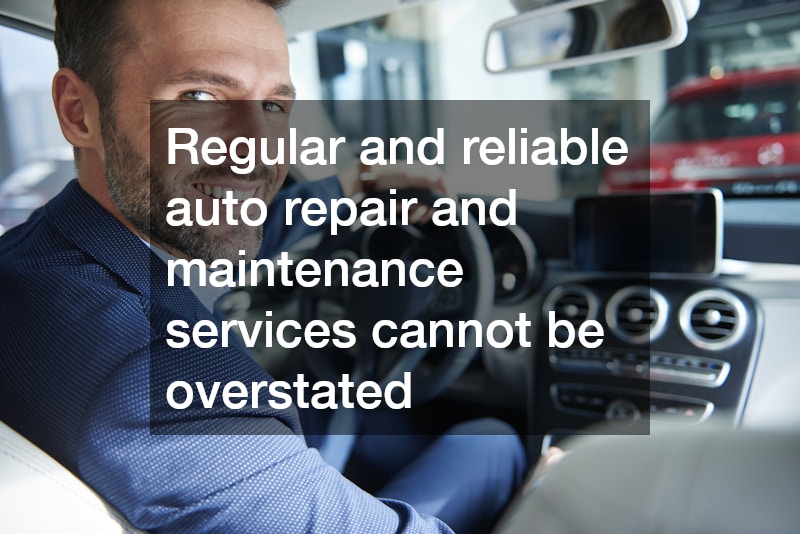
If you drive a car, you know it will eventually need to be repaired. Unfortunately, the need for auto repair can’t be predicted, and it can make a sizable dent in your budget. According to Industry Tap, one way to reduce car repairs is to follow your car’s recommended maintenance schedule. Many drivers who understand this principle will purchase a car care maintenance plan with a local auto service garage.
Auto Trader has found that car maintenance plans provide a discounted price for essential car care such as oil changes, tire rotation, and brake services. Your car will run more smoothly when it receives the required routine maintenance. In addition, bringing your car to one team of mechanics will allow that team to make necessary recommendations for additional services your car may need.
If your car’s garage doesn’t have a maintenance plan, ask if they’ll consider developing one. If not, look for a different garage to help your car get the care it needs to run more efficiently. An additional advantage of having a trusted auto care facility is knowing that there’s a team that can capably care for your car when it needs major car service. Remember, regular and reliable auto repair and maintenance services cannot be overstated.
When you own a car, you know it’s likely that your car will eventually need repairs. If you keep up with your car’s recommended maintenance schedule, you may be able to reduce the number of repairs your vehicle will need. One aspect of car maintenance involves your car’s battery. If you wonder, “How often are you supposed to change your car battery?” you can find out by checking the car’s owner’s manual. The same source can be used to learn more about your car’s battery needs.
If you need assistance with car battery replacement, an auto body shop or auto supply store can tell you which type of battery you need. These establishments can also guide you through a standard battery change. However, if you’re having problems with your car’s battery, you should request automotive battery troubleshooting at an auto repair facility.
According to the NAPA Knowhow Blog, a responsible car owner should learn some of the common car battery replacement signs. One of the most common signs is visible corrosion on your battery terminals. If your engine starts slowly or your headlights appear dimmer than usual, these can also be signs that you need a new battery.

When you have a car, you know you’ll have to spend time and money caring for it. You may wonder if there are guidelines – like factory-recommended maintenance -that you should follow. You can typically find a list of these recommendations in your owner’s manual.
Car maintenance facts can apply to all the parts of your car. For example, most auto mechanics recommend adhering to a tire maintenance schedule. For the same reasons, many mechanics advocate that the mechanic who does your oil changes also performs an overall check of your car’s safety. Many mechanics who perform oil changes will also typically offer tire rotations, among other services.
Most states require scheduled local auto inspections. These inspection deadlines typically coincide with the renewal of your auto insurance. These inspections may seem arbitrary, but they can often find problems in your car which must be fixed. By having this knowledge, you may prevent a future car accident.
Regular checks of your car can reveal problems. Napa Car Care says the 60K car maintenance check may be one of the most significant mechanic visits. By this time, you will know your car’s eccentricities and the mechanic may give you insight into your car’s potential future.

Since you want your car to get you from Point A to Point B and back again, it needs to be well-maintained. Even though your car’s manufacturer may have provided you with a list of regular maintenance requirements, it’s important to keep the basics in mind.
When to Get Your Oil Changed
It’s important to follow your car manufacturer’s recommendations for when to get your oil changed. Some may recommend changing a car’s oil every 5,000 miles or every 4 months.
Since there are different oils on the market, you will also want to keep your manufacturer’s recommendations in mind. Synthetic oils, for example, will burn cleaner than conventional oils.
It’s been found that Pennzoil Ultra Platinum Synthetic Oil will keep your pistons cleaner than other types of oils. In fact, this oil will keep those pistons 65% cleaner than outlined by the toughest industry standards. Furthermore, Pennzoil Ultra Platinum is also 25% cleaner than Mobil 1 or Valvoline SynPower.
When to Get Your Wheels Aligned
Your wheels’ alignment should be checked every 6,000 miles, according to industry experts. It is also recommended that you have your alignment checked at the same time you take your car in to have the oil changed. It makes sense to double-up on maintenance activities, particularly when convenient.
Tire rotations, however, should be taken care of every 7,500 miles or so. Once again, it’s important to follow your car manufacturer’s recommendations.
When to Have Your Brakes Repaired
You’re probably aware that there are 2 pads per rotor. When you press down on the brakes, each of these pads press against the rotor.
While your car’s brakes will usually last for 25,000 to 50,000 miles, quite a few manufacturers recommended replacing them under certain conditions. First of all, they should be replaced if there is just 1/8 inch or less of the pad lining left. Secondly, if you have 25,000 miles on your car, it is recommended that you have them replaced.
How to Prevent Your Car From Breaking Down
There are a variety of issues that will cause your car to break down. Some of these can be avoided when you check your vehicle’s belts and hoses periodically. If you notice these are worn down, then you want to replace them immediately.
Timing belts, according to the Car Care Council, usually need to be replaced at some point between 60,000 and 90,000 miles. Here again, it is important to refer to your car owner manual for the manufacturer’s recommendations.
How to Improve Your Gas Mileage
Given the cost of gas, learning how to improve your gas mileage may be at the top of your to-do list. Were you aware, for example, that your fuel efficiency can decrease up to 7% when your wheels aren’t properly aligned?
Other steps you can take to improve your mileage include replacing dirty and/or clogged air filters. This is particularly the case with older cars. You may be able to improve your mileage by up to 14% when you have this taken care of regularly.
Furthermore, the way you drive can also impact your gas mileage. Were you aware that aggressive driving has the potential to reduce mileage by as much as 33% when driving on highways and freeways? Since city and residential areas have more frequent stops, gas mileage can be reduced by 5% when someone is an aggressive driver.
When you take care of your car’s regular maintenance needs, it will perform more efficiently. If you haven’t taken it into a car care center recently, perhaps it’s time to do so now. More.

